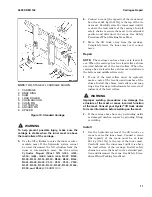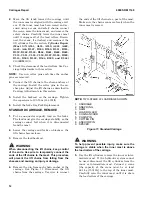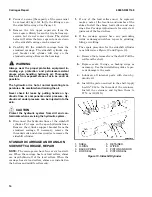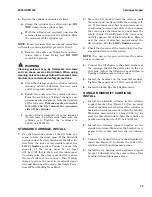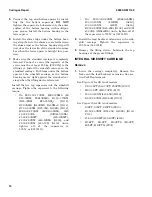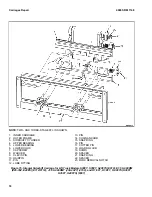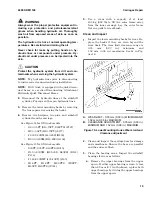
Fork Replacement
Forks are held on the carriage by hooks and kept in
position by pins inserted through top fork hooks
into slots in top carriage bar. If pin does not remain
engaged in carriage slot, replace with new pin.
On lift truck models not equipped with a fork posi-
tioner attachment, or equipped with a fork posi-
tioner manufactured before August, 2012, forks are
held on the carriage by hooks and kept in position
by pins inserted through the top fork hooks into
slots in top carriage bar. See Figure 4.
CAUTION
Remove fork latch pins if adding a fork positioner
attachment. Damage to forks and other carriage
components can occur if fork latch pins are not
removed prior to using attachment.
The forks are held on the carriage by hooks. Forks
on a standard carriage or an integral sideshift car-
riage not equipped with a fork positioner attach-
ment, are held in position by pins that fit through
the top fork hooks and into slots in the top carriage
bar. If pin does not remain engaged in carriage slot,
replace with new pin. Always check that pins for
forks keep forks in position on carriage. Replace
damaged fork pin parts. Forks are removed from
carriage by aligning forks with fork removal notch.
Fork removal notch is in bottom bar of carriage.
See Figure 4.
Forks used on an integral sideshift carriage equip-
ped with a fork positioner attachment are held in
position with fork carriers (inner and outer) that
slide along the fork positioner cylinder. Depending
on the size and configuration of forks installed on
lift truck, there may be a spacer bar between the
inner and outer fork carriers. See Figure 2. The
forks are removed from the carriage by aligning the
forks with fork removal notch. Fork removal notch
is in the bottom bar of carriage. See Figure 4.
1. OUTER FORK CARRIER
2. CAPSCREW
3. SPACER BAR*
4. INNER FORK CARRIER
*SPACER BAR USED ON 977 mm (38.5 in.) AND
1067 mm (42 in.) CLASS II CARRIAGES.
Figure 2. Fork Carrier Components
REMOVE, LIFT TRUCKS NOT EQUIPPED
WITH FORK POSITIONER OR EQUIPPED
WITH FORK POSITIONER BEFORE
AUGUST, 2012
WARNING
DO NOT try to remove a fork without a lifting de-
vice. Each hook fork for these lift trucks can
weigh 45 to 115 kg (99 to 254 lb).
CAUTION
There are NO pins in forks on lift trucks equipped
with a fork positioner.
NOTE:
Forks are to be replaced in sets, not indi-
vidually, by trained personnel only.
Safety Procedures When Working Near Mast
4000 SRM 1148
4

















